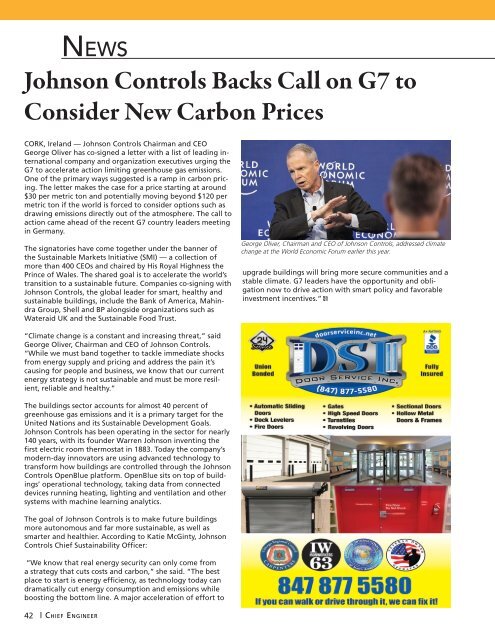CEAC-2022-08-August
Create successful ePaper yourself
Turn your PDF publications into a flip-book with our unique Google optimized e-Paper software.
News<br />
Johnson Controls Backs Call on G7 to<br />
Consider New Carbon Prices<br />
CORK, Ireland — Johnson Controls Chairman and CEO<br />
George Oliver has co-signed a letter with a list of leading international<br />
company and organization executives urging the<br />
G7 to accelerate action limiting greenhouse gas emissions.<br />
One of the primary ways suggested is a ramp in carbon pricing.<br />
The letter makes the case for a price starting at around<br />
$30 per metric ton and potentially moving beyond $120 per<br />
metric ton if the world is forced to consider options such as<br />
drawing emissions directly out of the atmosphere. The call to<br />
action came ahead of the recent G7 country leaders meeting<br />
in Germany.<br />
The signatories have come together under the banner of<br />
the Sustainable Markets Initiative (SMI) — a collection of<br />
more than 400 CEOs and chaired by His Royal Highness the<br />
Prince of Wales. The shared goal is to accelerate the world’s<br />
transition to a sustainable future. Companies co-signing with<br />
Johnson Controls, the global leader for smart, healthy and<br />
sustainable buildings, include the Bank of America, Mahindra<br />
Group, Shell and BP alongside organizations such as<br />
Wateraid UK and the Sustainable Food Trust.<br />
George Oliver, Chairman and CEO of Johnson Controls, addressed climate<br />
change at the World Economic Forum earlier this year.<br />
upgrade buildings will bring more secure communities and a<br />
stable climate. G7 leaders have the opportunity and obligation<br />
now to drive action with smart policy and favorable<br />
investment incentives.”<br />
“Climate change is a constant and increasing threat,” said<br />
George Oliver, Chairman and CEO of Johnson Controls.<br />
“While we must band together to tackle immediate shocks<br />
from energy supply and pricing and address the pain it’s<br />
causing for people and business, we know that our current<br />
energy strategy is not sustainable and must be more resilient,<br />
reliable and healthy.”<br />
The buildings sector accounts for almost 40 percent of<br />
greenhouse gas emissions and it is a primary target for the<br />
United Nations and its Sustainable Development Goals.<br />
Johnson Controls has been operating in the sector for nearly<br />
140 years, with its founder Warren Johnson inventing the<br />
first electric room thermostat in 1883. Today the company’s<br />
modern-day innovators are using advanced technology to<br />
transform how buildings are controlled through the Johnson<br />
Controls OpenBlue platform. OpenBlue sits on top of buildings’<br />
operational technology, taking data from connected<br />
devices running heating, lighting and ventilation and other<br />
systems with machine learning analytics.<br />
The goal of Johnson Controls is to make future buildings<br />
more autonomous and far more sustainable, as well as<br />
smarter and healthier. According to Katie McGinty, Johnson<br />
Controls Chief Sustainability Officer:<br />
“We know that real energy security can only come from<br />
a strategy that cuts costs and carbon,” she said. “The best<br />
place to start is energy efficiency, as technology today can<br />
dramatically cut energy consumption and emissions while<br />
boosting the bottom line. A major acceleration of effort to<br />
42<br />
| Chief Engineer

















